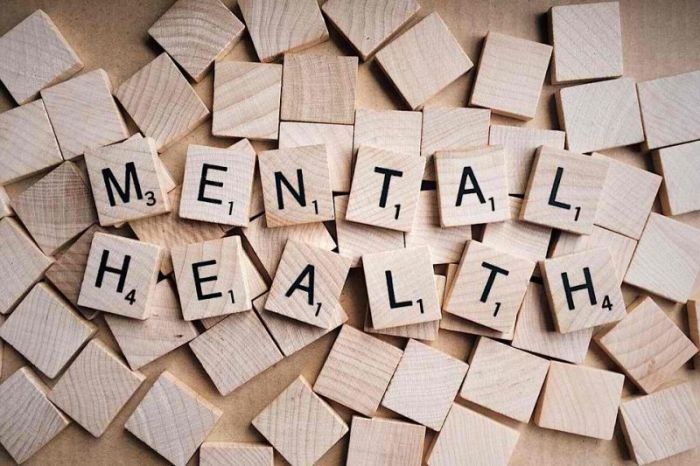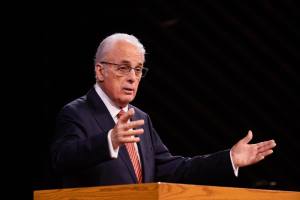Christians can’t ‘pray away mental illness’: Abby Johnson delves into myths and therapy (podcast)

When pro-life advocate Abby Johnson thinks back to the past 13 years of her life, she recalls needing medical intervention to relieve postpartum depression and psychosis following the birth of her daughter, Grace.
Johnson, host of the “Politely Rude” podcast on the Edifi podcast network, shed light on the stigmas associated with mental illness during the Nov. 4 episode titled "What's Wrong With My Faith?"
In the podcast, Johnson talked with Maura Preszler, author of the book, Choosing to See Beauty, and founder of the nonprofit organizationMade in His Image. Together, they tackled myths and misconceptions surrounding the topic of mental illness. Preszler also shared her journey to healing, offering hope to anyone facing mental health issues.
Johnson, who revealed that she is taking a selective serotonin reuptake inhibitor and an antidepressant medication, added that she will likely continue to do so for the rest of her life.
“There is a lot of shame and stigma surrounding mental illness. There shouldn’t be. It’s weird,” the speaker and author said.
But there was a time, the pro-life advocate said, when she felt she shouldn’t be on medication because she didn’t want to be associated with stigmas.
When she shared these concerns with her counselor, they reminded her that in the same way someone with a heart condition might need heart medication, someone with an “imbalance” needs their medication for their mind.
“I remember my psychiatrist said, ‘Stop trying to stigmatize yourself. Sometimes we just need this. We need help, counseling [and] meds.’ And I [replied] by saying, ‘You’re right,’” Johnson said. “There is so much stigma in our culture, in our world. Mental health is one of the most underfunded, most undervalued, most underutilized services [and] industries in our country.”
Preszler, who has worked to end stigmatization surrounding the topic of mental health issues, shared that despite being raised in a traditional Catholic home, behind closed doors, there was a lot of domestic violence, physical abuse and “evil” manipulation that took place.
“From a very young age, I learned to keep this a secret … no one knew what was going on,” Preszler recounted. “Because of the abuse, I developed an incredibly low self-esteem and it was always like I was walking around on eggshells.”
When Preszler was in eighth grade, she overheard an upperclassman gossiping about a girl in her class who was overweight. Preszler, who had always been athletic, said she had never been overweight herself, but she nevertheless internalized what the girls said.
“It was the first time that I remember looking in the mirror that night and just associating beauty with weight and calories were never something I worried about. It just didn’t faze me,” Preszler said. “And I remember that night, I told my mom that I wanted to lose 25 pounds. And that I was going to stop eating desserts and she just kind of brushed it off. She didn’t know what to do with what I was saying.”
“Her dismissal of my experience fueled me to really put a plan into action. And I did. And I lost a bunch of weight, very dangerously. I was 35 pounds lighter than I am today. And my pulse was in the low 20s,” Preszler continued.
Following the weight loss, Preszler said she remembers a doctor telling her about other women who had died from eating disorders.
“I didn’t want to die, but I didn’t want to gain any weight. But I just remember that night after the doctor had told me this, I started praying the rosary,” she said. “And I think it was just out of habit because that’s what we did every night. But I was praying it by myself. And I asked God to help me. I wanted to live.”
Preszler continued to struggle with eating disorders over the years. In college, however, she met a Catholic missionary group and became captivated by their work. She later went on a mission trip to India with the group, where she heard a missionary deliver a homily about God's love.
“When he gave this talk, it was such an ah-ha moment in my life. It was like, OK, this is it. This is what I have been searching for. This is the answer to my eating disorder. This is my purpose. There is a Father who loves me,” she recounted. “And it was such a radical moment in my life.”
After Preszler returned home from India, she went for a two-day psychiatric evaluation at The Institute of the Psychological Sciences in Arlington, Virginia. There, she was diagnosed with chronic post-traumatic stress disorder, depression and borderline personality disorder.
“The borderline personality disorder really shook me, but it also helped me understand what I had been going through,” Preszler said.
“A borderline personality disorder is like a 'come here, but I’m going to push you away' type mechanism — especially [for] children who grow up with trauma. They need to protect themselves, and the borderline personality disorder is what they do to protect themselves,” Preszler said.
Preszler followed doctors’ recommendations to move away from her family and set up boundaries with them. She found a Catholic psychologist to engage in trauma therapy and moved to Nashville, Tennessee, where she worked three jobs to support herself on her own.
“Therapy was the hardest, but the most beautiful thing that I’ve ever done, but I praise God. I'm so grateful to be here,” Preszler said. “I think one of the ways that we can help change [the mental health stigma] is by helping educate people.”
Preszler and Johnson discussed how a common mental health stigma among Catholics and Christians is to think that a person can “pray away their mental illness.”
“I had the same thought when I went to Institute of the Psychological Sciences. Maybe I’m not praying enough or saying enough rosaries," Preszler noted. "But the doctor on my case actually sat down and explained to me what exactly childhood trauma or any trauma does to the brain and how it alters the chemicals in your brain and the medication is just helping to create an equilibrium there and my neurotransmitters were off."
Preszler said that she believes that God has given the world medical professionals with degrees for a reason. She said more people, including Christians and Catholics, need to use their resources while becoming more educated about mental health issues.
“I am on medication, and I probably will be for the rest of my life, and there’s nothing wrong with that,” Preszler added. “I think we need to be educating people on what depression, anxiety and trauma does to the brain chemically and [then] we can bring about greater healing.”




























